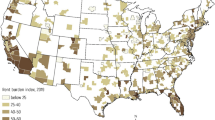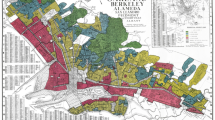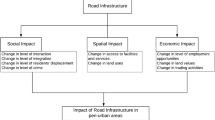Abstract
The paper adopts a difference-in-difference method to investigate the impacts of government-initiated neighborhood renewal programs on the values of aged housing properties in Hangzhou, China. Three empirical findings are obtained. First, the renewal raised living utility values and thus rents of the renewed properties. Second, the improvement in living utility value is partially offset by a reduction in the option value of housing redevelopment, because government planning policy specifies that the renewed neighborhoods will not be redeveloped at least in the next 5–10 years. Third, housing prices in neighborhoods farther away from scenic spots, which were generally lower, even dropped after the renewal. This evidences the complementarity between housing conditions and external environment, i.e., the renewal raises housing values less if the external environment is more inferior. These findings have important policy implications for urban renewals.




Similar content being viewed by others
Code availability
The authors confirm that the data and codes are available upon request, using them does not need consent of any third party.
Notes
The neighborhood renewal in this paper refers specifically to necessary renovations for aged buildings, rather than complete redevelopment.
Please refer to Section A1 of the online appendix for the details of the institutional background.
CREIS database, i.e., China Real Estate Index System, is one of the most authoritative real estate databases in China. It was initiated by the Research Institute of the State Council and China Real Estate Development Group in 1994.
References
Agarwal, S., Li, K., Qin, Y., Wu, J., & Yan, J. (2020). Tax evasion, capital gains taxes, and the housing market. Journal of Public Economics, 188, 104222.
Ahlfeldt, G. M., & Maennig, W. (2010). Substitutability and complementarity of urban amenities: External effects of built heritage in Berlin. Real Estate Economics, 38(2), 285–323. https://doi.org/10.1111/j.1540-6229.2010.00268.x
Albouy, D., Christensen, P., & Sarmiento-Barbieri, I. (2020). Unlocking amenities: Estimating public good complementarity. Journal of Public Economics, 182(33), 104110. https://doi.org/10.1016/j.jpubeco.2019.104110
Alonso, J. M., Andrews, R., & Jorda, V. (2019). Do neighbourhood renewal programs reduce crime rates? Evidence from England. Journal of Urban Economics, 110, 51–69. https://doi.org/10.1016/j.jue.2019.01.004
Baek, L. Y., & Jin, J. (2021). The effect of urban regeneration projects on the nearby housing prices in Seoul: Using the difference-in-differences model [서울시 도시재생사업이 주변지역 주택가격에 미치는 영향: 이중차분법을 활용하여]. Journal of Korea Planning Association, 56(4), 120–136. https://doi.org/10.17208/jkpa.2021.08.56.4.120
Bao, H. X. H., Larsson, J. P., & Wong, V. (2020b). Light at the end of the tunnel: The impacts of expected major transport improvements on residential property prices. Urban Studies. https://doi.org/10.1177/0042098020967308
Bao, H., Xu, Y., Zhang, W., & Zhang, S. (2020a). Has the monetary resettlement compensation policy hindered the two-way flow of resources between urban and rural areas? Land Use Policy, 99, 104953. https://doi.org/10.1016/j.landusepol.2020.104953
Baum-Snow, N., & Hartley, D. (2016). Accounting for central neighborhood change, 1980–2010. Social Science Electronic Publishing.
Chau, K. W., & Wong, S. K. (2014). Externalities of urban renewal: A real option perspective. Journal of Real Estate Finance and Economics, 48(3), 546–560. https://doi.org/10.1007/s11146-013-9418-z
Chen, Y. (2020). Financialising urban redevelopment: Transforming Shanghai’s waterfront. Land Use Policy. https://doi.org/10.1016/j.landusepol.2020.105126
Clapp, J. M., Jou, J.-B., & Lee, T. (2012). Hedonic models with redevelopment options under uncertainty. Real Estate Economics, 40(2), 197–216. https://doi.org/10.1111/j.1540-6229.2011.00323.x
Clapp, J. M., & Salavei, K. (2010). Hedonic pricing with redevelopment options: A new approach to estimating depreciation effects. Journal of Urban Economics, 67(3), 362–377. https://doi.org/10.1016/j.jue.2009.11.003
Dai, Y., & Xu, Y. (2018). Regulations enlarge inequality: Evidence from Yin and Yang contracts on Beijing’s Housing market. SSRN Electronic Journal.
Du, T., Du, S., & Wang, R. (2022). Social factors and residential satisfaction under urban renewal background: A comparative case study in Chongqing, China. Journal of Urban Planning and Development, 148(4), 05022030. https://doi.org/10.1061/(asce)up.1943-5444.0000869
Gu, T., Li, D., Zhu, S., & Wang, Y. (2019). Does sponge-style old community renewal lead to a satisfying life for residents? An investigation in Zhenjiang. China. Habitat International, 90, 102004. https://doi.org/10.1016/j.habitatint.2019.102004
Hatz, G. (2021). Can public subsidized urban renewal solve the gentrification issue? Dissecting the Viennese example. Cities, 115, 103218. https://doi.org/10.1016/j.cities.2021.103218
Hong, Y. (2018). Resident participation in urban renewal: focused on Sewoon renewal promotion project and Kwun Tong Town centre project. Frontiers of Architectural Research, 7(2), 197–210. https://doi.org/10.1016/j.foar.2018.01.001
Hornbeck, R., & Keniston, D. (2017). Creative destruction: Barriers to urban growth and the great Boston fire of 1872. American Economic Review, 107(6), 1365–1398. https://doi.org/10.1257/aer.20141707
Huang, X., He, D., Tang, S., & Li, X. (2020). Compensation, housing situation and residents’ satisfaction with the outcome of forced relocation: Evidence from urban China. Cities, 96, 102436. https://doi.org/10.1016/j.cities.2019.102436
Jiang, Y., Mohabir, N., Ma, R., Wu, L., & Chen, M. (2020). Whose village? Stakeholder interests in the urban renewal of Hubei old village in Shenzhen. Land Use Policy, 91, 104411. https://doi.org/10.1016/j.landusepol.2019.104411
Lang, W., Chen, T., & Li, X. (2016). A new style of urbanization in China: Transformation of urban rural communities. Habitat International, 55, 1–9. https://doi.org/10.1016/j.habitatint.2015.10.009
Lee, C.-C., Liang, C.-M., & Chen, C.-Y. (2017). The impact of urban renewal on neighborhood housing prices in Taipei: An application of the difference-in-difference method. Journal of Housing and the Built Environment, 32(3), 407–428. https://doi.org/10.1007/s10901-016-9518-1
Lee, S. Y. (2018). Cities for profit: Profit-driven gentrification in Seoul, South Korea. Urban Studies, 55(12), 2603–2617. https://doi.org/10.1177/0042098017727712
Li, B., Jin, C., Jansen, S. J. T., van der Heijden, H., & Boelhouwer, P. (2021). Residential satisfaction of private tenants in China’s superstar cities: The case of Shenzhen, China. Cities, 118, 103355. https://doi.org/10.1016/j.cities.2021.103355
Li, F., & Xiao, J. J. (2020). Losing the future: Household wealth from urban housing demolition and children’s human capital in China. China Economic Review, 63, 101533. https://doi.org/10.1016/j.chieco.2020.101533
Liu, Y., Tang, S., Geertman, S., Lin, Y., & van Oort, F. (2017). The chain effects of property-led redevelopment in Shenzhen: Price-shadowing and indirect displacement. Cities, 67, 31–42. https://doi.org/10.1016/j.cities.2017.04.017
Mesthrige, J. W., Wong, J. K. W., & Yuk, L. N. (2018). Conversion or redevelopment? Effects of revitalization of old industrial buildings on property values. Habitat International, 73, 53–64. https://doi.org/10.1016/j.habitatint.2017.12.005
Ooi, J. T. L., & Le, T. T. T. (2013). The spillover effects of infill developments on local housing prices. Regional Science and Urban Economics, 43(6), 850–861. https://doi.org/10.1016/j.regsciurbeco.2013.08.002
Piaggio, M. (2021). The value of public urban green spaces: Measuring the effects of proximity to and size of urban green spaces on housing market values in San Jose, Costa Rica. Land Use Policy, 109, 105656. https://doi.org/10.1016/j.lusepol.2021.105656
Rosenthal, S. S. (2008). Old homes, externalities, and poor neighborhoods. A model of urban decline and renewal. Journal of Urban Economics, 63(3), 816–840. https://doi.org/10.1016/j.jue.2007.06.003
Shen, T., Yao, X., & Wen, F. (2021). The urban regeneration engine model: An analytical framework and case study of the renewal of old communities. Land Use Policy, 108, 105571. https://doi.org/10.1016/j.landusepol.2021.105571
Stal, G. Y., & Zuberi, D. M. (2010). Ending the cycle of poverty through socio-economic integration: A comparison of moving to opportunity (MTO) in the United States and the Bijlmermeer revival project in the Netherlands. Cities, 27(1), 3–12. https://doi.org/10.1016/j.cities.2009.10.005
Sun, W., Fu, Y., & Zheng, S. (2017). local public service provision and spatial inequality in Chinese cities: The role of residential income sorting and land-use conditions. Journal of Regional Science, 57(4), 547–567.
Tang, B.-S., & Wong, K. T. (2020). Assessing externality: Successive event studies on market impacts of new housing development on an old residential neighbourhood. Environment and Planning B-Urban Analytics and City Science, 47(1), 156–173. https://doi.org/10.1177/2399808318774333
Tang, D., Gong, X., & Liu, M. (2022). Residents’ behavioral intention to participate in neighborhood micro-renewal based on an extended theory of planned behavior: A case study in Shanghai. China. Habitat International, 129, 102672. https://doi.org/10.1016/j.habitatint.2022.102672
Wang, M., Zhang, F., & Wu, F. (2021). Governing urban redevelopment: A case study of Yongqingfang in Guangzhou, China. Cities. https://doi.org/10.1016/j.cities.2021.103420
Wang, Y., Wang, Z., Yi, C., Wang, H., & Gao, R. (2020). The spillover effects of urban renewal projects on local housing Prices: empirical evidences based on shanty town reconstruction in Beijing [棚户区改造对周边住房价格的溢出效应基于北京市海淀区的实证分析]. Urban Studies, 27(12), 106–113.
Zhang, F., Liu, X., & Li, S. (2022). How does urban renewal affect housing price? Evidence from Beijing shantytown renewal plan. Applied Economics Letters, 29(12), 1055–1059. https://doi.org/10.1080/13504851.2021.1907280
Zhang, P., Sun, L., & Zhang, C. (2021). Understanding the role of homeownership in wealth inequality: Evidence from urban China (1995–2018). China Economic Review, 69, 101657. https://doi.org/10.1016/j.chieco.2021.101657
Zheng, X., Li, J.-X., Zheng, L., & Lv, J. (2020). Multi-owned property, urban renewal and neighborhood property value externalities: Revisiting the Hong Kong case. Cities, 107, 102915. https://doi.org/10.1016/j.cities.2020.102915
Zhu, S., Li, D., & Jiang, Y. (2020). The impacts of relationships between critical barriers on sustainable old residential neighborhood renewal in China. Habitat International, 103, 102232. https://doi.org/10.1016/j.habitatint.2020.102232
Funding
This work was supported by National Natural Science Foundation of China, awarded to Dr. Yanjiang Zhang, Grant No. 72004203; National Natural Science Foundation of China, awarded to Dr. Xiaofen Yu, Grant No.72274176; Fundamental Research Funds for the Provincial Universities of Zhejiang, Grant No. GB201901002.
Author information
Authors and Affiliations
Contributions
Dr. XY contributes to the research framework, improves the structure of the paper, and provides guidance on research methods; Mrs HF conducts the empirical analysis and drafts up the paper; Dr. SY verifies the overall reproducibility of the empirical results and improves the writing of the paper; Mr. HY cleans the data; Dr. YZ raises the research idea, frames up the research framework and methodology.
Corresponding author
Ethics declarations
Conflict of interest
The authors have no competing interests to declare that are relevant to the content of this article.
Ethical approval
The authors confirm that the content of this article does not need Ethics approval.
Consent for publication
The authors confirm that the publication of this paper does not need consent of any third party.
Additional information
Publisher's Note
Springer Nature remains neutral with regard to jurisdictional claims in published maps and institutional affiliations.
Supplementary Information
Below is the link to the electronic supplementary material.
Rights and permissions
Springer Nature or its licensor (e.g. a society or other partner) holds exclusive rights to this article under a publishing agreement with the author(s) or other rightsholder(s); author self-archiving of the accepted manuscript version of this article is solely governed by the terms of such publishing agreement and applicable law.
About this article
Cite this article
Yu, X., Fan, H., Yang, S. et al. Neighborhood renewal does not raise values of all aged residential properties: case from Hangzhou, China. J Hous and the Built Environ 39, 161–178 (2024). https://doi.org/10.1007/s10901-023-10072-8
Received:
Accepted:
Published:
Issue Date:
DOI: https://doi.org/10.1007/s10901-023-10072-8




